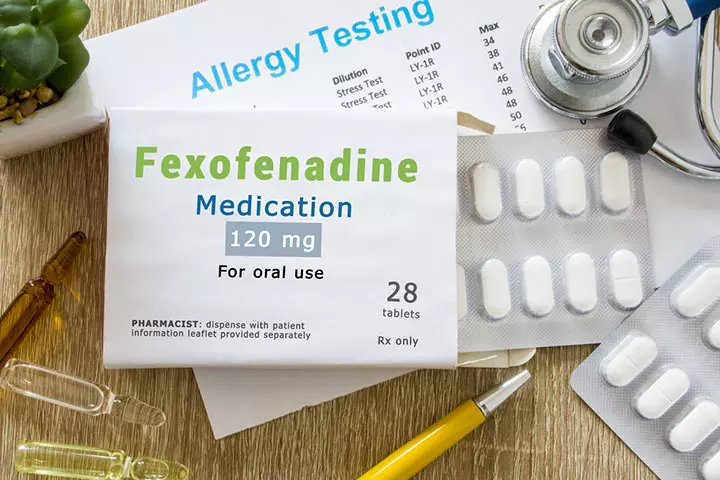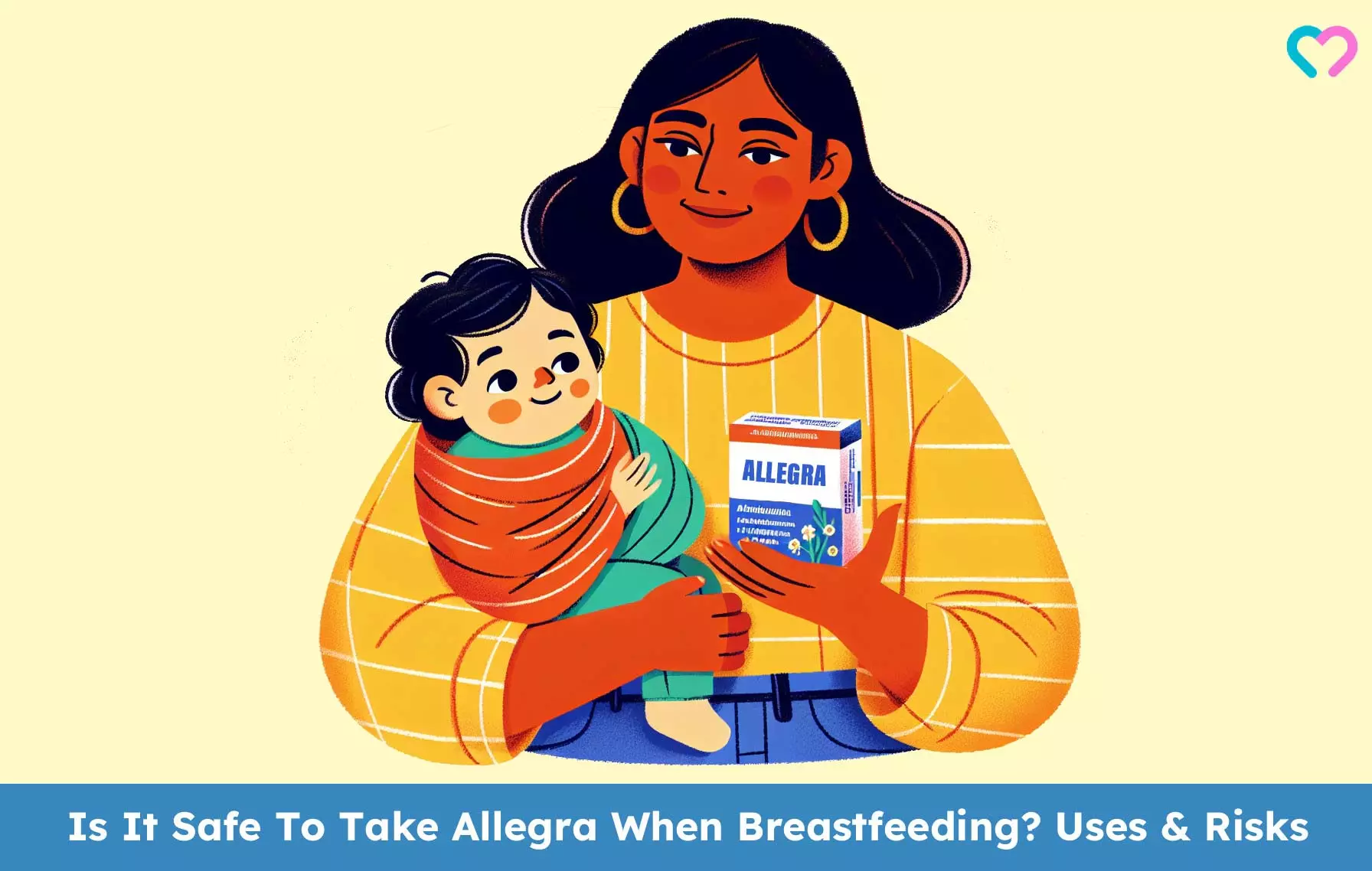
Image: ShutterStock
Many use antihistamines such as Allegra to treat certain allergies and health conditions. But can you take Allegra while breastfeeding? Although not all antihistamines are safe for breastfeeding, fexofenadine (Allegra) is considered safe for treating allergies in nursing mothers. However, lactating mothers are advised to seek a doctor’s consultation before taking any medication since they can help adjust the dosage, schedule medication and feeding time to reduce the effects, and provide tailored advice based on individual health needs. Keep reading to know more about the safety of antihistaminesiMedicines to treat the allergy symptoms. for nursing moms and the potential impact they can have on infant safety.

Key Pointers
- Fexofenadine is an antihistamine drug used to treat seasonal allergies and provide relief from itching, sneezing, and runny nose.
- It is considered safe for consumption in prescribed doses during breastfeeding as its contents are unlikely to harm the infant.
- Some side effects of the drug may include dizziness, headache, vomiting, diarrhea, rash, swelling, and difficulty breathing in severe cases.
- Fexofenadine may react with other medications and food; hence it is advised to consult a doctor before using it.
What Is Fexofenadine?

Fexofenadine is a drug used to treat seasonal allergies such as allergic rhinitis. It is an antihistamine that provides relief from sneezing, watery eyes, runny nose, itching, and other allergic conditions. Antihistamines block a natural substance in the body called histamineiA chemical responsible for the allergy symptoms. . Histamine typically reacts with an allergen and causes allergy symptoms. Other than allergies, Fexofenadine is also used to treat urticariaiA temporary reddish discoloration of the skin, swelling associated with itching. (red and itchy skin, hives) (1).
Fexofenadine is a second-generation antihistamine. Second-generation antihistamines are called non-sedating antihistamines as these do not cause drowsiness, unlike the first-generation ones (2). Fexofenadine is available in the form of tablets, capsules, and liquid medicine. Allegra is the brand name of fexofenadine.
Is It Safe To Use Fexofenadine (Allegra) While Breastfeeding?
It is quite safe to use Allegra while breastfeeding because fexofenadine passes into breast milk in low amounts (less than 1% of the dose taken)
. This amount generally does not cause any problems for breastfeeding infants. However, use any drug only after seeking approval from your doctor (3).
If you are using fexofenadine while breastfeeding, monitor your baby for any side effects. Look for unusual symptoms such as increased irritability, sudden changes in your baby’s sleeping, or feeding patterns (4).
Side Effects Of Fexofenadine (Allegra) While Breastfeeding
Allegra breastfeeding has certain side effects. It is not unusual as most drug use carries the risk of side effects. These side effects may be mild to severe.
If you plan to use fexofenadine while breastfeeding, observe any symptoms you experience after taking a dose. It is also a good practice to discuss any potential side effects with your doctor before you plan to take the drug while breastfeeding. Doing so can help you make an informed decision about your health (3).
Some common side effects of using fexofenadine while breastfeeding include (1):
- Dizziness
- Cough
- Fever
- Headache
- Pain during menstruation
- Pain in the back, arms, or legs

- Vomiting
- Diarrhea
The side effects of fexofenadine are rare. But if you experience the following symptoms after a dose of fexofenadine, inform your doctor about it (4). Some of the severe effects of fexofenadine include (1):
- Rash
- Swollen lips, tongue, throat or eyes
- Swelling in hands or legs
- Difficulty in breathing
- Trouble swallowing
- Hives
Fexofenadine use may also cause different side effects on your maternal health. If you feel any discomfort after using fexofenadine, tell your doctor about it.
 Caution
CautionPrecautions
You may need to follow certain precautions with your fexofenadine use. So, here we look at some Allegra and breastfeeding safety tips.
- Fexofenadine may interact with your other medicines or certain foods. There are no specific foods that you must avoid when using this drug unless advised by your doctor. For instance, your doctor may ask you to avoid eating apples and citrus fruits like orange and grapefruit when using fexofenadine. Substances present in these fruits may interfere with the absorption of fexofenadine (5).

- You may be allergic to a compound in fexofenadine. Therefore, it is important to monitor your health even when you use a safe drug like fexofenadine while breastfeeding (1). If you notice any unusual signs in your baby after taking fexofenadine, consult a pediatrician promptly.
- Always maintain a time gap of two hours between your fexofenadine dose and medicines or supplements that contain magnesium or aluminum. These substances can interfere with optimum fexofenadine absorption in the body (5).
 Point to consider
Point to considerUse Of Antihistamines While Breastfeeding
It is safe to use all antihistamines while breastfeeding. Only a minimal amount of these drugs pass into the breast milk; there are no serious concerns about the use of antihistamines while nursing. But you may find it useful to know detailed information about antihistamine use while breastfeeding.
- Second-generation antihistamines like fexofenadine are considered safer to use compared with first-generation antihistamines like diphenhydramine, chlorpheniramineiAn antihistamine to treat runny nose, watery eyes, and itching caused due to allergies. , and others. The reason for this is that newer antihistamines do not cause sedating effects in users. Drowsiness can be risky for anyone as it can interfere with tasks. Imagine feeling sleepy while driving with your infant to the doctor or any such dangerous scenario. The sedating effects of antihistamines can also transfer to your breastfeeding infant. If you are concerned with this aspect of antihistamines, ask your doctor to recommend one that causes the least sedative effect and least amount of drug transfer. All second-generation antihistamines like fexofenadine, loratadine, cetirizine, and desloratadineiAn antihistamine to treat the symptoms of allergy. are non-sedating drugs (2).

- Use any drug while breastfeeding only if it is necessary for your well-being. Seasonal allergies are not life-threatening health conditions. But symptoms of allergies can be very uncomfortable. Unless you experience side effects from fexofenadine or any other antihistamine drug, you can safely use it while breastfeeding. But resist the temptation of buying an over-the-counter (OTC) dose of the medicine. Discuss your allergy symptoms with your doctor for the appropriate antihistamine and its right dose for you (6).
- There are clinical studies available on first-generation antihistamines. But adequate research is not yet available for all second-generation antihistamines. Clinical research on the effects of fexofenadine during lactation is low (6).
 Point to consider
Point to considerUsing Fexofenadine (Allegra) While Breastfeeding
Even though fexofenadine passes into breast milk in low amounts, you can further reduce this risk by following certain measures (7).
- Ask your doctor to recommend fexofenadine in the lowest dose possible to treat your allergies.
- If your allergy symptoms consist of only nasal congestion, ask your doctor for a safe nasal spray you can use while breastfeeding. Avoid taking an oral medicine if you can treat a condition with a nasal spray or topical application.

- Feed your baby before you use fexofenadine. This way you can further reduce your baby’s exposure to the drug. You can also express the breast milk for your baby’s next feed before you use fexofenadine.
- You may worry about the effects of your drug use during breastfeeding on your baby’s health. But you do not need to suffer from allergies or other health problems while you are nursing your child. You can make safe choices about your drug use with the right information at your disposal.
- Share your concerns with your doctor and ask for medicines that you can use during breastfeeding without any problems to you and your baby’s health.
Frequently Asked Questions
1. How long does antihistamine stay in breast milk?
Antihistamines are safe to use during breastfeeding, and the small amounts secreted in the breast milk would not cause any adverse effects on the infants (9). However, since there are limited studies on the effect of antihistamines during breastfeeding, it is important to consult your doctor about the time for which the prescribed antihistamine will stay in the breast milk (10).
2. Will Allegra dry up my milk supply?
Most allergy medicines are safe while breastfeeding and may not impact your milk production. However, it is better to identify your allergy symptoms and treat them locally rather than take medications that might enter the blood or affect breast milk (11).
3. Can Allegra cause cardiac arrhythmias and ischemic colitis?
Although no direct connections are found between Allegra and colitis, a small study shows that the medication may increase the risk of cardiac arrhythmia in some patients (12).
It is wise to consult a doctor before taking antihistamines while breastfeeding. These medications are used for treating allergies, and lactating mothers must know the safe options. Fexofenadine or Allegra is considered a safe antihistamine during breastfeeding. Taking it under medical supervision can help prevent overdose and side effects such as dizziness, body pains, and loose stools. Look out for any signs of discomfort in your baby. This drug may be present in varying amounts in OTC products, and you should avoid self-medicating under all circumstances.
Infographic: Notable Points About Fexofenadine For Lactating Women
Fexofenadine, sold under the brand name Allegra, is an easily available OTC antihistamine medication; however, certain factors should be considered when having it, especially if breastfeeding your child. The following infographic includes some precautions you must remember to prevent any potential risks.
Some thing wrong with infographic shortcode. please verify shortcode syntaxIllustration: Is It Safe To Take Allegra When Breastfeeding? Uses & Risks

Image: Dall·E/MomJunction Design Team
Curious about whether or not antihistamines affect your milk supply? Dive into this video to uncover insights and learn how these common medications may impact breastfeeding moms.
References
- Fexofenadine.
https://medlineplus.gov/druginfo/meds/a697035.html - Antihistamines.
https://my.clevelandclinic.org/health/treatments/antihistamines - Fexofenadine.
https://mothertobaby.org/fact-sheets/fexofenadine-pregnancy/pdf/ - Selecting and using antihistamines during breastfeeding.
https://www.sps.nhs.uk/articles/using-antihistamines-during-breastfeeding/ - Allegra Allergy 180 mg tablet.
https://healthy.kaiserpermanente.org/health-wellness/drug-encyclopedia/drug.allegra-allergy-180-mg-tablet.563468 - Miranda So et al.; (2010); Safety of antihistamines during pregnancy and lactation.
https://www.ncbi.nlm.nih.gov/pmc/articles/PMC2868610/ - Drug Safety in Lactation.
https://www.medsafe.govt.nz/profs/puarticles/lactation.htm - Fexofenadine; (2006); Drugs and Lactation Database (LactMed) [Internet]. Bethesda (MD): National Library of Medicine (US).
https://www.ncbi.nlm.nih.gov/books/NBK500677/ - Safety of Antihistamines during pregnancy and lactation
https://www.ncbi.nlm.nih.gov/pmc/articles/PMC2868610/#:~:text=All%20antihistamines%20are%20considered%20safeeffects%20on%20a%20breastfeeding%20infant. - Selecting and using antihistamines during breastfeeding.
https://www.sps.nhs.uk/articles/using-antihistamines-during-breastfeeding/ - Treating seasonal allergies while breastfeeding.
https://milkworks.org/file_download/inline/c79c7562-31f1-4083-bd09-2b5e8e252dd7#:~:text=The%20two%20most%20common%20questionsnot%20impact%20your%20milk%20supply. - NH Shear; (1999); Fexofenadine allegra associated with ventricular.
https://www.jwatch.org/jd199906010000009/1999/06/01/fexofenadine-allegra-associated-with-ventricular
Community Experiences
Join the conversation and become a part of our nurturing community! Share your stories, experiences, and insights to connect with fellow parents.
Read full bio of Dr. Prakhar Nyati
Read full bio of Jessica Albert
Read full bio of Rohit Garoo
Read full bio of Anindita Ghatak

















